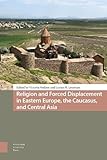Religion and Forced Displacement in Eastern Europe, the Caucasus, and Central Asia / ed. by Victoria Hudson, Lucian N. Leustean.
Material type: TextPublisher: Amsterdam : Amsterdam University Press, [2022]Copyright date: ©2022Description: 1 online resource (414 p.)Content type:
TextPublisher: Amsterdam : Amsterdam University Press, [2022]Copyright date: ©2022Description: 1 online resource (414 p.)Content type: - 9789048553938
- Church work with refugees
- Forced migration -- Asia, Central
- Forced migration -- Caucasus
- Forced migration -- Europe, Eastern
- Refugees
- Conflict and Peace
- Contemporary Society
- Europe
- Migration and Mobility Studies
- Population and migration geography
- Religion and Theology
- Religion and politics
- Social and Political Sciences
- RELIGION / Religious Intolerance, Persecution & Conflict
- Religion, forced displacement, humanitarian action, Christianity, Islam
- 362.87 23//eng/20220516eng
- online - DeGruyter
| Item type | Current library | Call number | URL | Status | Notes | Barcode | |
|---|---|---|---|---|---|---|---|
 eBook
eBook
|
Biblioteca "Angelicum" Pont. Univ. S.Tommaso d'Aquino Nuvola online | online - DeGruyter (Browse shelf(Opens below)) | Online access | Not for loan (Accesso limitato) | Accesso per gli utenti autorizzati / Access for authorized users | (dgr)9789048553938 |
Frontmatter -- Table of Contents -- List of Tables -- Abbreviations -- Acknowledgments -- 1 Religion and Forced Displacement in Eastern Europe, the Caucasus and Central Asia -- 2 Humanitarian Action, Forced Displacement and Religion -- Section I Eastern Europe -- 3 Religion and Forced Displacement in Modern Bulgaria -- 4 State, Religion and Refugees in Serbia -- 5 Asylum and Migration System Reform -- 6 Responding to Mass Emigration amidst Competing Narratives of Identity -- 7 The Roman Catholic Church and Forced Displacement in Poland -- Section II Russia and Ukraine -- 8 ‘My Strength Is Made Perfect in Weakness’ -- 9 Forced Displacement, Religious Freedom and the Russia-Ukraine Conflict -- Section III The Caucasus -- 10 ‘Forgotten by Many and Remembered by Few’ -- 11 Welcoming Refugees -- Section IV Central Asia -- 12 The Response of the Metropolitan District of the Russian Orthodox Church in Kazakhstan to the Emigration of Ethnic Russians from Independent Kazakhstan -- 13 Сommunity Intolerance, State Repression and Forced Displacement in the Kyrgyz Republic -- 14 Migration within and from Uzbekistan -- Index
restricted access online access with authorization star
http://purl.org/coar/access_right/c_16ec
This book examines the social and political mobilisation of religious communities towards forced displacement in Eastern Europe, the Caucasus, and Central Asia. It analyses religious strategies in relation to tolerance and transitory environments as a result of the breakup of the Soviet Union and Yugoslavia in the early 1990s, the post-2011 Syrian crisis and the 2014 Russian takeover of Crimea. How do religious actors and state bodies engage with refugees and migrants? What are the mechanisms of religious support towards forcibly displaced communities? The book argues that when states do not act as providers of human security, religious communities, as representatives of civil society and often closer to the grass roots level, can be well placed to serve populations in need. The book brings together scholars from across the region and provides a comprehensive overview of the ways in which religious communities tackle humanitarian crises in contemporary Armenia, Bulgaria, Greece, Georgia, Kazakhstan, Kyrgyzstan, Moldova, Poland, Russia, Serbia, Ukraine and Uzbekistan.
Mode of access: Internet via World Wide Web.
In English.
Description based on online resource; title from PDF title page (publisher's Web site, viewed 01. Dez 2022)


